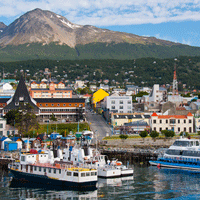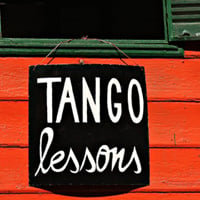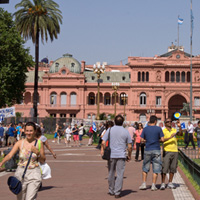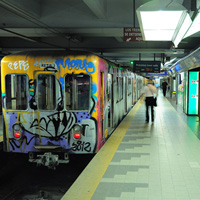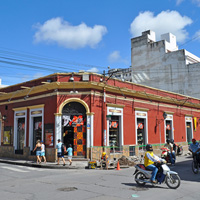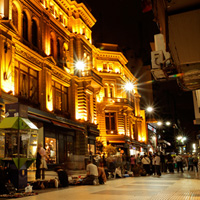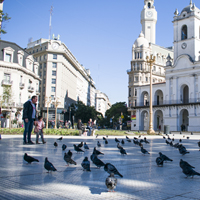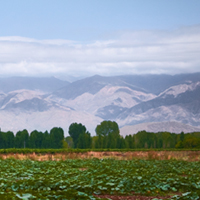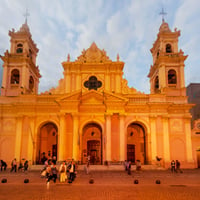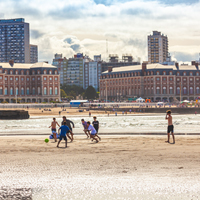Argentina
Coastal BeachesArgentina is a diverse and vibrant country located in the southern part of South America. It is the eighth-largest country in the world and the second-largest in South America, after Brazil. The nation boasts a rich cultural heritage, influenced by Spanish colonization and waves of European immigration, which is reflected in its architecture, music, and cuisine. Buenos Aires, the capital city, is known for its bustling streets, European-style buildings, and the tango dance. The country's geography is incredibly varied, ranging from the subtropical north to the subpolar south. The northwest features arid deserts and colorful Andean valleys, while the central Pampas is the agricultural heartland where the famous Argentine beef is produced. To the west, the Andes mountain range presents stunning landscapes and the highest peak in the Western Hemisphere, Aconcagua. Patagonia, in the south, offers vast and sparsely populated steppes, glaciers, and wildlife. The Iguazu Falls, on the border with Brazil, are one of the natural wonders of the world. Argentina's economy is rich in natural resources and has a strong agricultural sector, although it has faced economic challenges and periods of instability. The country has a passion for sports, especially football, and is known for producing some of the world's best players. Despite its challenges, Argentina remains a country of great potential and enduring appeal, with a population that is warm, resilient, and proud of their rich cultural tapestry.
 PassportCard Expat Health Insurance
PassportCard Expat Health InsuranceGet Quote
Never worry about paying your medical bills out of pocket again. The innovative PassportCard allows for a stress-free experience for all expat families, remote travelers, and workers. With a 24/7 customer service and an outstanding customer base of over 2 Million clients, it will feel like medical care at home. Get up to 10% off on your policy now.
 PassportCard Expat Health Insurance
PassportCard Expat Health InsuranceNever worry about paying your medical bills out of pocket again. The innovative PassportCard allows for a stress-free experience for all expat families, remote travelers, and workers. With a 24/7 customer service and an outstanding customer base of over 2 Million clients, it will feel like medical care at home. Get up to 10% off on your policy now.
Get Quote
Living in Argentina
Best Places to Live in Argentina
Visa & Residency
Obtaining a residency in Argentina involves several steps and can be considered an average challenge compared to other countries. The process begins with determining the appropriate visa type based on the individual's circumstances. The most common types of visas for expats are the Rentista Visa, for individuals with a steady income from abroad, and the Pensionado Visa, for retirees with a pension. To apply for these visas, expats must first gather the required documents, which typically include a valid passport, birth certificate, proof of income or pension, criminal record check from the country of origin, and proof of health insurance. These documents must be legalized and translated into Spanish. The next step is to submit the visa application at an Argentine consulate or embassy in the applicant's home country or, in some cases, within Argentina. The application must be accompanied by the relevant supporting documents. After submission, the consulate will review the application, which can take several months. During this period, applicants may be asked to provide additional information or attend an interview. Once the consulate approves the visa, the applicant will receive a visa entry permit, allowing them to travel to Argentina. Upon arrival, they must make an appointment with the National Office (Dirección Nacional de Migraciones) to obtain their residency card. This card is typically valid for one year and can be renewed annually. The difficulty of the process can vary based on the applicant's nationality, the completeness of their application, and their ability to provide the necessary documentation. It is advisable for expats to seek legal assistance or consult with immigration experts to navigate the process smoothly. Overall, while there are several bureaucratic steps involved, the process is quite structured and manageable for those who prepare adequately.
Healthcare in Argentina
Argentina's system is a mix of public, private, and social security services. The public system is universal and free for all residents, including expats who have obtained residency status. It is funded by taxes and provides a range of services from basic care to complex surgeries. However, the quality and speed of public healthcare can vary greatly depending on the region, with better services typically found in larger cities like Buenos Aires. Private healthcare offers higher quality services and shorter waiting times but at a higher cost. Many Argentinians and expats opt for private health insurance to access these services. Expats can access public healthcare once they have residency, but many choose private care for more immediate and comprehensive coverage.
Cost of Living
The cost of living in Argentina can be considered moderate, with expenses varying significantly between urban and rural areas. Buenos Aires, as a major city, tends to be more expensive, while smaller towns and the countryside offer a more affordable lifestyle.
Weather
Argentina has a diverse climate ranging from subtropical in the north to subpolar in the far south. The central region has a temperate climate with distinct seasons, hot summers, and cool winters. The Andes region can be arid and cold, while Patagonia in the south is known for strong winds and cool temperatures year-round.
Educational System in Argentina
The educational system in Argentina is overseen by the Ministry of Education and is structured into several levels: initial (pre-school), primary, secondary, and higher education. Education in Argentina is compulsory from the ages of 4 to 18, which includes both primary and secondary education. The school year typically runs from March to December. Children start their schooling in pre-school at the age of 4 or 5. Primary education, known as "educación primaria," consists of six or seven years, depending on the province, and is followed by secondary education, "educación secundaria," which also lasts for six years. Secondary education is divided into two cycles: a basic cycle of three years and a diversified cycle of three years, where students can choose a specialization. The quality of education in Argentina is considered to be good, with a strong emphasis on literature, social sciences, and a broad curriculum. Public education is free at all levels, and the country has a high literacy rate. However, there are also private schools available, which can be either secular or religious, and these may charge tuition fees. After completing secondary education, students receive a "Bachiller" diploma, which qualifies them to enter university.
Copyright 1997-2025 Burlingame Interactive, Inc.

